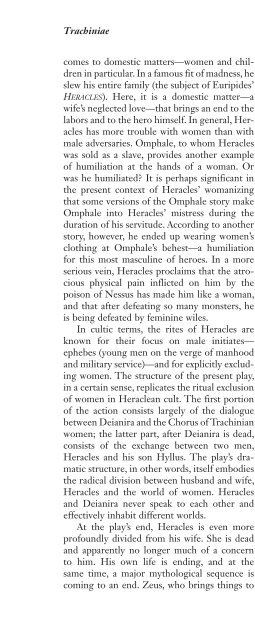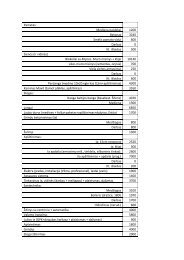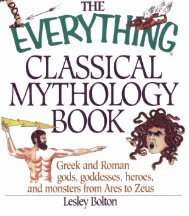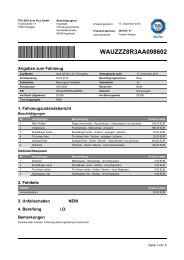Encyclopedia of Greek and Roman Mythology (Facts on File Library ...
Encyclopedia of Greek and Roman Mythology (Facts on File Library ...
Encyclopedia of Greek and Roman Mythology (Facts on File Library ...
Create successful ePaper yourself
Turn your PDF publications into a flip-book with our unique Google optimized e-Paper software.
Trachiniae<br />
comes to domestic matters—women <str<strong>on</strong>g>and</str<strong>on</strong>g> children<br />
in particular. In a famous fit <str<strong>on</strong>g>of</str<strong>on</strong>g> madness, he<br />
slew his entire family (the subject <str<strong>on</strong>g>of</str<strong>on</strong>g> Euripides’<br />
HeracLes). Here, it is a domestic matter—a<br />
wife’s neglected love—that brings an end to the<br />
labors <str<strong>on</strong>g>and</str<strong>on</strong>g> to the hero himself. In general, Heracles<br />
has more trouble with women than with<br />
male adversaries. Omphale, to whom Heracles<br />
was sold as a slave, provides another example<br />
<str<strong>on</strong>g>of</str<strong>on</strong>g> humiliati<strong>on</strong> at the h<str<strong>on</strong>g>and</str<strong>on</strong>g>s <str<strong>on</strong>g>of</str<strong>on</strong>g> a woman. Or<br />
was he humiliated? It is perhaps significant in<br />
the present c<strong>on</strong>text <str<strong>on</strong>g>of</str<strong>on</strong>g> Heracles’ womanizing<br />
that some versi<strong>on</strong>s <str<strong>on</strong>g>of</str<strong>on</strong>g> the Omphale story make<br />
Omphale into Heracles’ mistress during the<br />
durati<strong>on</strong> <str<strong>on</strong>g>of</str<strong>on</strong>g> his servitude. According to another<br />
story, however, he ended up wearing women’s<br />
clothing at Omphale’s behest—a humiliati<strong>on</strong><br />
for this most masculine <str<strong>on</strong>g>of</str<strong>on</strong>g> heroes. In a more<br />
serious vein, Heracles proclaims that the atrocious<br />
physical pain inflicted <strong>on</strong> him by the<br />
pois<strong>on</strong> <str<strong>on</strong>g>of</str<strong>on</strong>g> Nessus has made him like a woman,<br />
<str<strong>on</strong>g>and</str<strong>on</strong>g> that after defeating so many m<strong>on</strong>sters, he<br />
is being defeated by feminine wiles.<br />
In cultic terms, the rites <str<strong>on</strong>g>of</str<strong>on</strong>g> Heracles are<br />
known for their focus <strong>on</strong> male initiates—<br />
ephebes (young men <strong>on</strong> the verge <str<strong>on</strong>g>of</str<strong>on</strong>g> manhood<br />
<str<strong>on</strong>g>and</str<strong>on</strong>g> military service)—<str<strong>on</strong>g>and</str<strong>on</strong>g> for explicitly excluding<br />
women. The structure <str<strong>on</strong>g>of</str<strong>on</strong>g> the present play,<br />
in a certain sense, replicates the ritual exclusi<strong>on</strong><br />
<str<strong>on</strong>g>of</str<strong>on</strong>g> women in Heraclean cult. The first porti<strong>on</strong><br />
<str<strong>on</strong>g>of</str<strong>on</strong>g> the acti<strong>on</strong> c<strong>on</strong>sists largely <str<strong>on</strong>g>of</str<strong>on</strong>g> the dialogue<br />
between Deianira <str<strong>on</strong>g>and</str<strong>on</strong>g> the Chorus <str<strong>on</strong>g>of</str<strong>on</strong>g> Trachinian<br />
women; the latter part, after Deianira is dead,<br />
c<strong>on</strong>sists <str<strong>on</strong>g>of</str<strong>on</strong>g> the exchange between two men,<br />
Heracles <str<strong>on</strong>g>and</str<strong>on</strong>g> his s<strong>on</strong> Hyllus. The play’s dramatic<br />
structure, in other words, itself embodies<br />
the radical divisi<strong>on</strong> between husb<str<strong>on</strong>g>and</str<strong>on</strong>g> <str<strong>on</strong>g>and</str<strong>on</strong>g> wife,<br />
Heracles <str<strong>on</strong>g>and</str<strong>on</strong>g> the world <str<strong>on</strong>g>of</str<strong>on</strong>g> women. Heracles<br />
<str<strong>on</strong>g>and</str<strong>on</strong>g> Deianira never speak to each other <str<strong>on</strong>g>and</str<strong>on</strong>g><br />
effectively inhabit different worlds.<br />
At the play’s end, Heracles is even more<br />
pr<str<strong>on</strong>g>of</str<strong>on</strong>g>oundly divided from his wife. She is dead<br />
<str<strong>on</strong>g>and</str<strong>on</strong>g> apparently no l<strong>on</strong>ger much <str<strong>on</strong>g>of</str<strong>on</strong>g> a c<strong>on</strong>cern<br />
to him. His own life is ending, <str<strong>on</strong>g>and</str<strong>on</strong>g> at the<br />
same time, a major mythological sequence is<br />
coming to an end. Zeus, who brings things to<br />
their completi<strong>on</strong>, oversees the terrible process.<br />
The Heraclean mythology is eminently serial<br />
in nature—a l<strong>on</strong>g series <str<strong>on</strong>g>of</str<strong>on</strong>g> labors, <strong>on</strong>e after<br />
another, <str<strong>on</strong>g>and</str<strong>on</strong>g> he succeeds at each <strong>on</strong>e <strong>on</strong>ly to<br />
commence another. In Euripides’ aLcestis,<br />
we meet him between labors—<strong>on</strong>e <str<strong>on</strong>g>of</str<strong>on</strong>g> the few<br />
moments that Heracles might be inserted<br />
into a narrative that does not form part <str<strong>on</strong>g>of</str<strong>on</strong>g> his<br />
can<strong>on</strong>ical labors. He is c<strong>on</strong>stantly defined by<br />
the <strong>on</strong>going sequence <str<strong>on</strong>g>of</str<strong>on</strong>g> tasks. Thus, bringing<br />
that sequence to an end requires a special<br />
situati<strong>on</strong>, a culminating labor or task distinct<br />
from the rest. Zeus, who in the iLiad is the <strong>on</strong>e<br />
who brings things to the final end/completi<strong>on</strong>/purpose<br />
(telos), is thus somehow behind<br />
everything that happens to his suffering s<strong>on</strong>,<br />
yet he is also strangely <str<strong>on</strong>g>and</str<strong>on</strong>g> disturbingly absent.<br />
The relati<strong>on</strong> <str<strong>on</strong>g>of</str<strong>on</strong>g> Zeus <str<strong>on</strong>g>and</str<strong>on</strong>g> Heracles’ final end<br />
are met<strong>on</strong>ymically signaled <strong>on</strong> more than <strong>on</strong>e<br />
occasi<strong>on</strong> when a character, without apparent<br />
awareness <str<strong>on</strong>g>of</str<strong>on</strong>g> the fatal significance, refers to<br />
Mount Oeta as being sacred to Zeus.<br />
The last, uncan<strong>on</strong>ical labor <str<strong>on</strong>g>of</str<strong>on</strong>g> Heracles that<br />
culminates there, however, does not feature a<br />
positive task to be accomplished or a foe to be<br />
overcome. Mount Oeta will witness <strong>on</strong>ly the<br />
horrors <str<strong>on</strong>g>of</str<strong>on</strong>g> the hero’s own self-c<strong>on</strong>suming body.<br />
Reduced to suffering, Heracles experiences the<br />
purest labor he has had—relentless, unimaginable<br />
pain—<str<strong>on</strong>g>and</str<strong>on</strong>g>, rather than having an outlet<br />
for his aggressive, masculine valor, the hero is<br />
turned in up<strong>on</strong> his own nature <str<strong>on</strong>g>and</str<strong>on</strong>g> resources.<br />
Heracles does the best he can, given the circumstances,<br />
<str<strong>on</strong>g>and</str<strong>on</strong>g> assumes c<strong>on</strong>trol <str<strong>on</strong>g>of</str<strong>on</strong>g> his own<br />
death. By having himself burned alive, he forces<br />
himself to endure the ultimate in pain to escape<br />
his present humiliati<strong>on</strong>. We might compare<br />
Ajax, who escapes the grotesquery <str<strong>on</strong>g>of</str<strong>on</strong>g> his deeds<br />
<str<strong>on</strong>g>and</str<strong>on</strong>g> subsequent mental anguish by suicide, or<br />
Philoctetes, whose unbearable wound makes<br />
him wish for death. In being thus turned <strong>on</strong>to<br />
himself <str<strong>on</strong>g>and</str<strong>on</strong>g> his own suffering, grotesque body<br />
as the object <str<strong>on</strong>g>and</str<strong>on</strong>g> goal <str<strong>on</strong>g>of</str<strong>on</strong>g> his final labor, Heracles<br />
becomes a truly Sophoclean hero.<br />
The big questi<strong>on</strong> that surrounds this<br />
end is the questi<strong>on</strong> <str<strong>on</strong>g>of</str<strong>on</strong>g> Heracles’ apotheosis.







